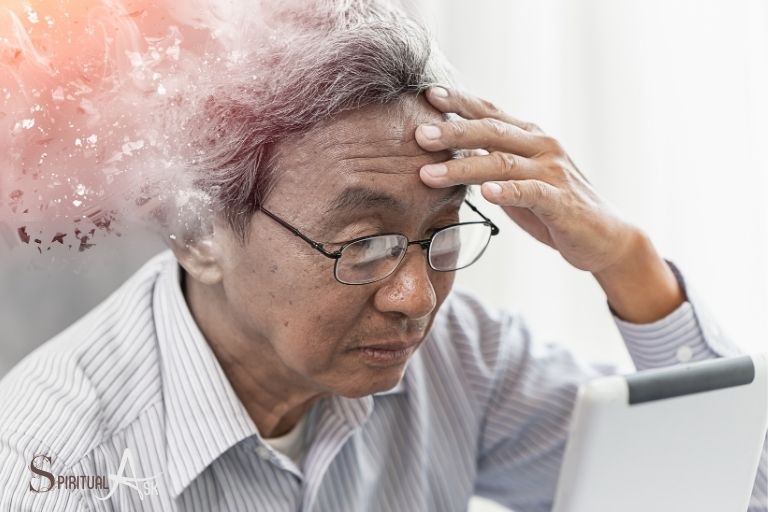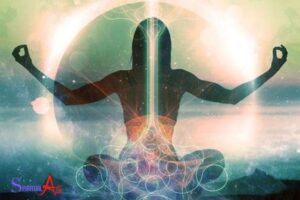Spiritual Awakening And Schizophrenia: Overlapping Symptoms!
Spiritual awakening and schizophrenia are two distinct experiences that can sometimes share overlapping symptoms, making it difficult to differentiate between the two.
However, spiritual awakening is a process of personal growth and self-discovery, while schizophrenia is a chronic mental disorder characterized by hallucinations, delusions, and disorganized thinking.
Spiritual awakening refers to a shift in consciousness where individuals become more aware of their true nature, purpose, and connection to the universe. It is often associated with a greater sense of compassion, empathy, and understanding of oneself and others.
On the other hand, schizophrenia is a serious mental illness affecting how a person thinks, feels, and behaves. It may result in false beliefs, confused thinking, and difficulty distinguishing between reality and imagination.
Differentiating between spiritual awakening and schizophrenia can be challenging due to their overlapping symptoms, such as auditory hallucinations or feelings of grandiosity. However, one key distinction is the context in which these experiences occur. Those undergoing a spiritual awakening may be actively seeking higher consciousness or enlightenment, while those with schizophrenia may not have the same intentional spiritual awakening exploration. Additionally, individuals experiencing spiritual awakenings may exhibit an increased sense of empathy and interconnectedness with the universe, while those with schizophrenia may struggle with disorganized thoughts and behaviors. It is important for healthcare professionals to carefully assess the individual’s beliefs and experiences to provide the appropriate support and treatment.
However, spiritual awakening generally leads to positive personal growth and development, whereas schizophrenia can cause significant distress, dysfunction, and impairment in daily life.
It is crucial for individuals experiencing such symptoms to seek guidance from a mental health professional
5 Criteria: Spiritual Awakening And Schizophrenia
| Criteria | Spiritual Awakening | Schizophrenia |
|---|---|---|
| Definition | A profound shift in consciousness and awareness, often characterized by a deep sense of personal growth, interconnectedness, and a broader understanding of life. | A chronic and severe mental disorder that affects how a person thinks, feels, and behaves; characterized by a disconnection from reality, often manifesting as hallucinations, delusions, and disorganized thinking. |
| Symptoms or Signs | – Intuition increases – Empathy and sensitivity to others’ emotions – Feeling a deep sense of peace or harmony – A greater appreciation for nature and the environment – Desire for self-improvement and personal growth | – Auditory or visual hallucinations – Delusions (believing things that are not true or logical) – Disorganized thinking and speech patterns – Social withdrawal – Trouble maintaining personal hygiene |
| Causes or Triggers | – Psychological or emotional trauma – Practices like meditation or yoga – Personal development work – Near-death experiences – Spiritual practices from various religious or non-religious traditions | – Genetics – Brain chemistry imbalances – Environmental factors (e.g., exposure to toxins) – Drug or alcohol abuse – Stressful life events |
| Treatment or Management | – Meditation and mindfulness practices – Self-reflection and journaling – Spiritual counseling or therapy – Engaging in supportive spiritual or personal growth communities – Continued education or exploration of personal beliefs | – Antipsychotic medications – Psychotherapy – Social skills training – Supportive housing and vocational rehabilitation – Family support and education |
| Prognosis | While spiritual awakening is often considered a positive and growth-oriented experience, it can also be overwhelming or difficult for some individuals to process. With the right support, tools, and guidance, spiritual awakening can lead to lasting personal growth and transformation. | Schizophrenia is a lifelong condition, but with proper treatment and support, many people can manage their symptoms, maintain a good quality of life, and contribute meaningfully to society. However, some individuals may continue to struggle with symptoms or experience relapses. |
Key Takeaway

Five Facts About: Spiritual Awakening And Schizophrenia
What Is Spiritual Awakening And Schizophrenia
There has been a longstanding debate as to whether spiritual awakening and schizophrenia are related or dissociated.
Spiritual awakening aims to help individuals actualize or recognize their true self, while schizophrenia is a mental illness that can impact one’s ability to think logically, distinguish between reality and hallucinations, and communicate effectively.
We will discuss the key points about spiritual awakening and schizophrenia, and examine the link between them.
Defining Spiritual Awakening And Schizophrenia
Spiritual awakening is a journey of self-discovery that enables individuals to find the truth within themselves. It is an enlightening experience, which occurs when one becomes aware of their internal consciousness and the power it possesses.
One feels a sense of connectedness with everything around them, and their mind and body are in complete harmony.
On the other hand, schizophrenia is a serious mental illness that affects how a person thinks, feels, and behaves. Schizophrenia symptoms can vary, but common symptoms include delusions, hallucinations, disorganized thinking, and abnormal behaviors.
It can impact anyone from any background, and can be disabling if not managed appropriately.
The Link Between Spiritual Awakening And Schizophrenia
The link between spiritual awakening and schizophrenia is a topic of discussion that many experts have conflicting views on. Some believe that spiritual awakening is a natural cure for schizophrenia, while others firmly oppose this ideology.
Here are some points to consider:
- Spiritual awakening can help individuals with schizophrenia understand their true self and find their purpose in life. It can also help them cope with their symptoms by finding inner peace.
- However, spiritual awakening can exacerbate schizophrenia symptoms such as delusions and hallucinations by providing a false sense of reality.
- It is crucial to distinguish between spiritual awakenings and psychotic episodes in individuals with schizophrenia. It takes a trained and experienced professional to identify the difference and provide appropriate treatment.
- It is not uncommon for individuals with schizophrenia to experience spiritual awakenings during the healing process. However, it does not necessarily mean that they are cured of their mental illness.
Spiritual awakening and schizophrenia are two different concepts that should not be confused. While a spiritual awakening can bring peace and understanding, it is crucial to seek appropriate medical help when dealing with schizophrenia.
A trained and experienced professional should guide individuals with schizophrenia through their healing process to ensure that it is a safe and healthy experience.
What Causes Spiritual Awakening In Schizophrenia
The Role Of Spirituality And Religion In Schizophrenia
Spirituality and religion play an essential role in the lives of many individuals with schizophrenia.
Here are some key points:
- Many people find comfort and support in their spiritual beliefs.
- Spirituality and religion may help patients cope with the symptoms of schizophrenia.
- Religious and spiritual practices can offer a sense of purpose and belonging.
The Effect Of Psychotic Symptoms On Spirituality
Schizophrenia can affect a person’s spirituality in various ways.
Here are some key points:
- Psychotic symptoms, such as delusions and hallucinations, can influence a person’s religious or spiritual beliefs.
- Patients may experience heightened religious or spiritual experiences during psychotic episodes.
- The impact of psychotic symptoms on someone’s spirituality can vary from person to person.
How Spiritual Experiences Can Lead To Radical Changes In Schizophrenic Patients
Spiritual experiences can have a profound impact on individuals with schizophrenia, leading to significant changes in their lives.
Here are some key points:
- Some patients may experience spiritual awakenings that lead to positive changes in behavior and outlook.
- Radical changes can include a newfound sense of purpose, forgiveness, and compassion for others.
- These spiritual experiences can occur spontaneously or through religious or spiritual practices and therapy.
Understanding the relationship between spirituality and schizophrenia may help patients cope better with their symptoms and lead to better mental health outcomes.
Benefits Of Spiritual Awakening For Schizophrenia Patients
Spiritual awakening and schizophrenia: benefits of spiritual awakening for schizophrenia patients
Schizophrenia is a mental disorder that affects the person’s ability to think, feel, and behave normally. The symptoms of schizophrenia can be debilitating, often leading to social isolation, impaired cognition, and emotional distress.
While medication and therapy can help manage the symptoms, patients can also benefit greatly from spiritual practices that can improve their mental health and emotional well-being.
How Spiritual Practices Can Improve The Mental And Emotional Well-Being Of Schizophrenic Patients
Spiritual practices like meditation, prayer, and yoga can help patients with schizophrenia in several ways:
- Reduce stress and anxiety: Spiritual practices can help ease the mind and promote relaxation in patients. By focusing on the breath, repeating mantras, and visualizing images, patients can reduce stress levels and alleviate symptoms of anxiety.
- Improve mood and emotional stability: Spiritual practices can promote positive emotions in patients, improving their overall mood. They can also help maintain emotional stability and reduce the risk of mood swings.
- Provide a sense of purpose and meaning: Spiritual practices can help patients find a sense of purpose and direction in their lives. This can be especially beneficial for schizophrenia patients who may struggle with feelings of hopelessness and despair.
- Foster a sense of connection: Spiritual practices can help patients feel connected to something greater than themselves. This can provide a sense of belonging, reducing the sense of isolation that patients may experience.
The Role Of Spiritual Practices In Reducing Psychosis And Depressive Symptoms
Psychotic and depressive symptoms are often associated with schizophrenia. While medication and therapy can help alleviate these symptoms,
Spiritual practices can also play a role in reducing their severity:
- Reduce symptoms of psychosis: Spiritual practices like meditation and mindfulness can help patients better manage delusions and hallucinations. By encouraging patients to focus on the present moment, these practices can reduce the intensity of psychotic symptoms.
- Alleviate symptoms of depression: Spiritual practices can help alleviate symptoms of depression in patients. By promoting a sense of well-being and positive emotions, spiritual practices can reduce the risk of mood disorders that often go hand in hand with schizophrenia.
How Spiritual Awakening Can Improve The Patient’S Ability To Cope With Schizophrenia
Spiritual awakening can be a transformative experience for schizophrenia patients, providing them with the strength and resilience needed to cope with the disorder:
- Increases self-awareness: Spiritual awakening can help patients develop a greater understanding of themselves and their experience of schizophrenia. This increased self-awareness can help patients better manage their symptoms and improve their quality of life.
- Increases mental clarity and focus: Spiritual awakening can help patients develop greater mental clarity and focus. This can be particularly beneficial for patients who struggle with cognitive impairments associated with schizophrenia.
- Provides hope and inspiration: Spiritual awakening can provide patients with a sense of hope and inspiration. This can be especially important for patients who may struggle with a sense of hopelessness and despair.
Spiritual practices and spiritual awakening can provide numerous benefits for schizophrenia patients.
By reducing symptoms of stress, anxiety, depression, and psychosis, patients can improve their quality of life, manage their symptoms better and find a sense of meaning and purpose in their lives.
So, if you or someone you know is struggling with schizophrenia, consider incorporating spiritual practices into your treatment plan to improve your mental and emotional well-being.
Spiritual Awakening As A Complementary Treatment For Schizophrenia
Spiritual awakening and schizophrenia: spiritual awakening as a complementary treatment for schizophrenia
Schizophrenia is a severe mental health disorder that can impact every aspect of a person’s life, from their ability to think and feel to how they perceive the world.
While traditional medication and therapy can be effective in managing some of the symptoms of schizophrenia, there is growing interest in complementary therapies such as spiritual awakening.
The Place Of Spiritual Awakening In Schizophrenia Treatment Plan
Spiritual awakening can be defined as a state of heightened awareness and connection to a higher power or inner self. For people living with schizophrenia, spiritual awakening can offer new ways to cope and feel a sense of purpose and fulfillment.
However, it is important to note that spiritual awakening should only be used as a complementary therapy, not as a substitute for traditional medical treatment and therapy.
Some benefits of spiritual awakening as a complementary treatment include:
- Lower levels of stress and anxiety
- Improved mood and emotional well-being
- Increased feelings of hope and purpose
- Greater resilience in the face of difficult situations
How To Incorporate Non-Traditional Therapies In Schizophrenia Treatment
Incorporating spiritual awakening into a schizophrenia treatment plan can be a gradual process. It is essential to speak with a qualified mental health professional to ensure that the therapy is safe and effective for the individual.
Some steps to take to incorporate non-traditional therapies in the treatment of schizophrenia include:
- Discussing the potential benefits and risks of spiritual awakening with a healthcare professional
- Finding a qualified spiritual teacher or counselor who has experience working with individuals living with schizophrenia
- Gradually incorporating spiritual awakening practices into daily routines
- Monitoring symptoms and adjusting treatment as necessary
The Benefits Of Combining Traditional And Non-Traditional Therapies
While traditional medications and therapy can be effective in managing some symptoms of schizophrenia, they may not be enough to address the complex needs of the individual.
Combining traditional and non-traditional therapies can offer a more holistic approach to treatment that may improve outcomes.
Some benefits of combining traditional and non-traditional therapies include:
- Addressing the physical, emotional, and spiritual needs of the individual
- Supporting self-care and self-expression
- Empowering individuals to take an active role in their treatment and recovery
- Enhancing overall quality of life
Spiritual awakening can be a powerful complementary therapy for individuals living with schizophrenia. When used in conjunction with traditional medical treatment and therapy, the benefits of spiritual awakening can be profound.
By incorporating a variety of therapies and practices into a comprehensive treatment plan, individuals living with schizophrenia can improve their overall health and well-being and lead more fulfilling lives.
FAQ About Spiritual Awakening And Schizophrenia
How Does Spiritual Awakening Relate To Schizophrenia?
Spiritual awakening and schizophrenia are not the same, though some experience both. Schizophrenia is a mental illness, while spiritual awakening refers to a pathway of spiritual consciousness.
What Is Spiritual Emergency?
Spiritual emergency refers to unexpected psychological changes, such as religious experiences and extended mystical encounters. It might trigger anxiety, depression, paranoia, and other physical symptoms.
How Can Schizophrenia Affect Your Spiritual Life?
Schizophrenia might result in a range of unexpected beliefs and experiences. People with schizophrenia are more likely to be religious and might experience spiritual awakenings.
What Are The Similarities Between Spiritual Awakening And Schizophrenia?
Both spiritual awakening and schizophrenia can lead to a range of exceptional experiences and altered perceptions. Some people with schizophrenia might experience both; others might confuse the two.
Conclusion
Spiritual awakening and schizophrenia can be a complex interplay of experiences, emotions, and beliefs. While there are similarities between mystical experiences and psychotic symptoms, it’s important to note that spiritual experiences are not always pathological.
Rather, they can be transformative and life-changing experiences that can also bring healing and growth.
People who have schizophrenia and have undergone spiritual awakenings can benefit from a supportive network of friends, family, mental health professionals, and spiritual leaders who understand the complexities involved.
While there is still a lot that needs to be understood about the relationship between spirituality and mental health, research has shown the importance of a holistic approach that includes spirituality and religion in the treatment of mental illness.
As we continue to learn more about spiritual experiences, it’s important to remember that we are all unique individuals with our own beliefs and experiences, and that there is no one-size-fits-all approach when it comes to mental health.






